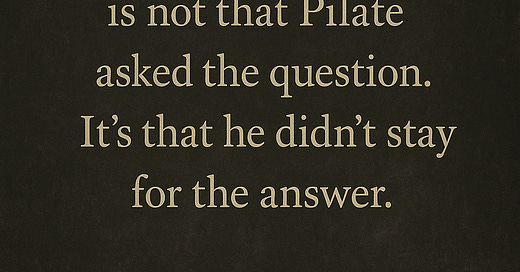“What is truth?” - Pontius Pilate, staring Truth in the eyes and not recognizing Him.
He asked it not as a seeker, but as a cynic.
Not with awe, but with shrugging indifference.
And yet his question still echoes down the corridors of every courtroom, newsroom, classroom, and conversation thread.
It’s the oldest question we keep asking with new arrogance.
The Age of the Shrug
We live in a generation of Pilate’s children -
Masters of spin, allergic to absolutes, suspicious of anything that claims to be True with a capital “T.”
We don't crucify Truth anymore with nails.
We do it with smirks.
We drown it in relativism and silence it with slogans.
Everyone has “their truth.”
No one is wrong.
And yet - we’re more divided, anxious, and disillusioned than ever.
How can so many people believe they’re right… and yet the world feel so wrong?
Truth on Trial
In my recent conversations with a friend - a man of conviction, intelligence, and a sincere hunger for God - I found myself in the witness box of my own certainty.
We spoke of doctrine, of Israel, of history, of deception and hope.
We agreed. We disagreed. We refined. We wrestled.
And in that sacred exchange, I realized something deeply uncomfortable:
I was clinging to some beliefs not because they were true, but because they were familiar.
I was mistaking clarity for correctness.
I was defending my ground instead of exploring holy ground.
And then it hit me:
Maybe the trial of Jesus never ended.
Maybe Truth is still on trial -
Every time I substitute conviction for curiosity,
Certainty for humility,
Noise for silence.
Philosophers Tried. Prophets Cried. Pilate Denied.
Socrates drank poison for the truth he believed could never be fully known.
Plato drew shadows on cave walls to explain our blindness to it.
Aristotle built logic around it.
Jesus embodied it.
“I am the Way, the Truth, and the Life.” — John 14:6
Not a truth.
Not a subjective perspective.
But The Truth - a Person, not just a principle.
Yet when He stood before power, wearing a crown of thorns instead of a golden laurel,
Pilate looked Him in the eyes and said,
“What is truth?”
…then washed his hands of the answer.
Isn’t that what many still do?
We stand before the mirror of the gospel -
Before the raw and inconvenient claims of Jesus -
And instead of kneeling,
We philosophize.
We tweet.
We pivot.
We wash.
Truth: Not a Weapon, But a Way
The modern mind wants to win truth, not submit to it.
We quote it like ammo.
We wield it like a sword.
But Jesus didn’t say “I hold the truth”.
He said, “I AM the truth.”
To follow Truth is to be undone, not upgraded.
It’s to let go of everything I use to shield myself:
My opinions.
My politics.
My safe theology.
Even my cherished certainties.
And maybe that’s why truth is so rarely found.
Because it doesn't live in our comfort zones.
It hides in our surrender.
Archaeology of the Soul
We dig in dirt to find coins and crosses, but what about the excavation of our inner world?
What if our tightly held beliefs are just ruins -
Constructed on the sediment of inherited bias, cultural narratives, and well-polished echo chambers?
To know Truth, you must first un-know your own illusion of it.
As G.K. Chesterton said:
“The object of opening the mind… is to shut it again on something solid.”
Truth is not fluid.
It is not trending.
It is not yours or mine.
It is God’s - and it is holy.
Final Verdict
The greatest tragedy is not that Pilate asked the question.
It’s that he didn’t stay for the answer.
He walked away.
As we often do.
But Truth did not walk away from him.
It carried a cross.
It climbed a hill.
It bled for the blind.
“You shall know the truth, and the truth shall set you free.” — John 8:32
So here’s the real question, the one that haunts me after my dialogues with my friend:
Am I seeking to be right, or am I seeking to be true?
One leads to arrogance.
The other, to God.



